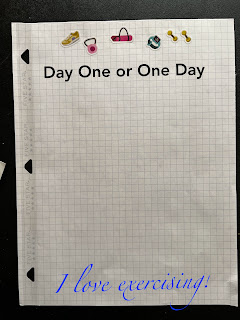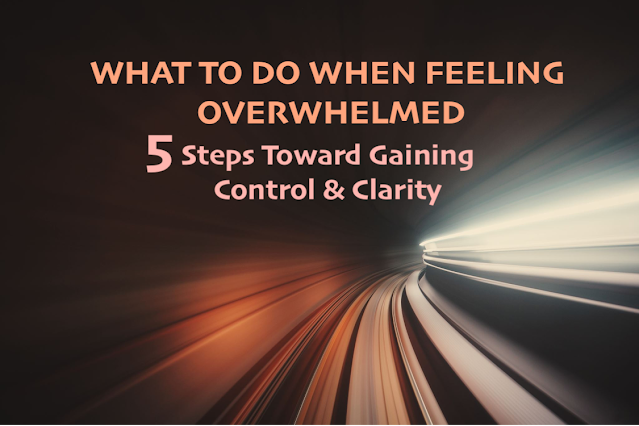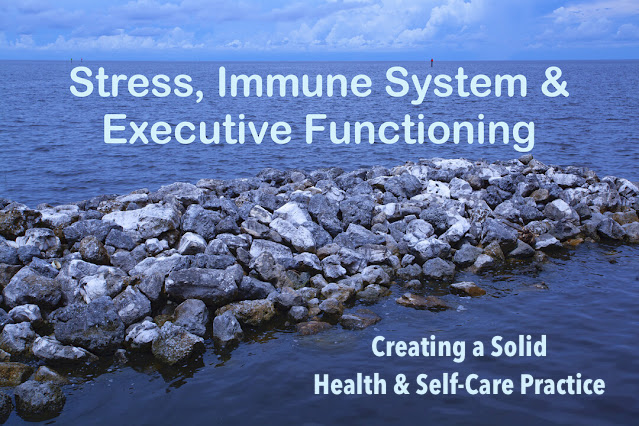STRENGTHEN YOUR BODY, STRENGTHEN YOUR MENTAL HEALTH: How Exercise Can Enhance Your Well-Being
THE BODY ACHIEVES WHAT
THE MIND BELIEVES
Whether you are already enjoying a high fitness level or getting started, everyone and everybody can benefit from movement. Your body loves and craves movement. Both moderate and strenuous forms of exercise help relieve symptoms of stress and anxiety, while simultaneously improving executive functioning, your brain's cognitive processes for goal oriented and purposeful behaviors. Executive functioning thrives on healthy energy, and exercise delivers such energy! Aim for a minimum of 150 minutes per week, spread over 5 days at 30 minutes per day.
There is a large body of evidence supporting physical activity's effects on the management of mental health challenges, including trauma and more complex psychiatric disorders. Cardio-type workouts and resistance training, also known as strength or weight training, have been shown to ameliorate symptomatology of depression and improve mood and energy. In addition, movement helps to release emotions that may have become trapped in the body, expressing themselves in the form of pain, muscle tension, and/or other related symptoms. While talking about these emotions will help get them off your chest as when participating in psychotherapy, moving also has its benefits in releasing these stored up emotions, especially when accompanied with deep, diaphragmatic breathing. An additional benefit to this type of breathing? Healthy lungs!
BREATHE BETTER TO FEEL BETTER
When you are engaged in physical activity, your heart and lungs work harder to supply extra oxygen to your muscles. The more physically fit you are, the more efficient your body becomes in transporting oxygen. What once had you breathless has now become your warm-up. The healthier your lungs, the better your breathing. The better your breathing, the - lower your stress level
- higher your immune functioning
- clearer your thinking
- lower your blood pressure
- higher your energy
- lower your stress level
- higher your immune functioning
- clearer your thinking
- lower your blood pressure
- higher your energy
PROTECT YOUR HEART
Cardiovascular diseases (CVDs) continue to be the leading cause of death globally, and they are currently growing in strength, affecting younger individuals in rates never before seen. Despite significant advancement in pharmacological intervention, CVDs continue to be major medical challenges. WHAT CAN HELP? Cardiovascular health is very receptive to a healthy lifestyle, such as one that includes exercise. However, exercise alone is not the answer since a fatigued body is highly unlikely to get into a fitness regimen. You need energy to expend energy! Sleep plays a large role in the generation of healthy energy. The strong connection between the circadian rhythm and exercise play a critical role in heart health.
The circadian cycle, or rhythm, is an internal, natural process that regulates your sleep-wake cycle. It typically repeats every 24-hours. Circadian rhythm and exercise have important effects on each other, and on your body. The benefits of exercise to the heart is well researched. Aerobic type exercises are highly effective in managing blood pressure and cholesterol, and as a result, help to reduce myocardial infarction and strokes. SO WHAT DOES THIS MEAN? To maximize physical and mental health benefits, we need sleep! Restorative sleep!
Sleep researchers are continuing to make powerful, and even surprising, discoveries about the science of sleep. It wasn't long ago that sleep was described as a passively dormant body and brain state, in which little, if anything, was happening. But, as it turns out, the various intricate and coordinated activities occurring during sleep are vital to life, affecting both our mental and physical health.
How to Get Restorative Sleep
A nightly bedtime ritual composed of relaxing and sleep inducing habits will do wonders for your energy, stress levels, and overall health.
Here are some helpful tips:
★Your bedroom should be cool and dark, and free from distracting noise and devices. Some find white noise or background sounds of nature soothing.
★Try to keep to a schedule. Attempt to go to bed and wake up at the same time each day.
★Avoid consuming caffeinated beverages after noon and late night snacking.☀Get some sunlight. Just 20 minutes of natural light exposure during the morning will help your body produce melatonin when it's time for sleep.
THE VARIOUS WORKOUTS
Most workouts fall into broad categories of cardiovascular, strength training, and flexibility/stretching. There are so many ways to move your body and finding the one or combination of movements that appeal to you will help keep you motivated and in shape.
What is the best workout program?
The one you will consistently do!
Cardiovascular (cardio) exercise is defined as any type of workout that elevates your heart rate and maintains the elevation for a prolonged period of time. Your respiratory system (airways, lungs and blood vessels) will start working harder as you begin to breathe more rapidly and deeply. Your blood vessels will expand to transport more oxygen to your muscles, and your body will release endorphins (which are natural painkillers).
Cardio workouts promote feeling good. Few report otherwise. Lower levels of depression and fatigue result as an outcome of a consistent cardio workout.
Strength training is a type of resistance training, with the objective of increasing physical strength. Resistance training increases muscle strength. A stronger body is a more functional body. This type of training can also boost mental health.
Resistance training requires you to focus on the movements and muscles you're innervating. There will be the application of focused attention as your brain concentrates on a specific activity for a duration of time. This will improve your mind-muscle connection, and presents an excellent segue into the mind-body connection—> yoga!
The physical component of Yoga, named asana enhances and energizes the mind and body, by linking breath to movement. This synchronization can be experienced as a moving meditation. It involves the mindful connection of breath, sequenced movement and balance.
Yoga both strengthens the nervous system while simultaneously calming it. A stronger and calmer nervous system is one of the greatest gifts you can give yourself.
Productivity, focus, and clarity soar when you and your body feel calm and connected, while fatigue, inattentiveness, and irritability elevate when you and your body feel dysregulated, disconnected, and fearful (or anxious).
Added benefits to the twists and stretches involved in many yoga practices is increased flexibility and mobility. Whereas flexibility is the muscle's ability to stretch, mobility requires the strength to hold this flexibility. Yoga enhances both!
Yoga has a powerful effect on both mind and body, regardless of your present level of health or fitness. A fairly inexpensive and easily accessible intervention with a plethora of benefits and few (if any) side-effects if practiced responsibly, yoga has been shown to promote good health in as little as a few hours per week. Whether practiced privately or within a group setting, in-studio or on-line, yoga's popularity has made it increasingly available.
Getting Started
There are two components to a fitness regimen:
Getting Started
Staying Motivated
Both require finding and staying true to your WHY!
Why am I doing this?
What does being physically fit mean for me?
When we lose motivation, coming back to our why helps.
If your plan is to become fit and you are serious about this intention, then start slowly and build your momentum. Before long, working out will become a habit and part of a larger system, well-integrated into your lifestyle.
If you are already fit and planning on maintaining or enhancing your fitness, then you have momentum working in your favor. Consistency is key! You are past the "Getting Started" and in the "Staying Motivated" phase.
Exercise, in its varied forms, is something you GET TO DO, as a way to show yourself and your body respect and love. Remember how much fun it was to move as a young child? Well, your body craves that movement today as an adult! It not only craves it, but it needs it. Movement is one of your body's most basic functions.
Getting into a regular fitness regimen will require bypassing "feeling like it" especially in the beginning. Once working out becomes part of your lifestyle and you are noticing benefits, then the motivation will in all likelihood organically follow. Motivation often accompanies results and confidence. So, when you start seeing results and feel more confident in your workouts, motivation will tend to tag along.
Here are some tips to get started:
IDENTIFY WHAT YOU ARE GOING TO DO
A good workout does not have to be a 1-hour weight lifting session or a 5 mile beach run. It can be as simple as performing a few sit-ups and push-ups, or a short walk around the neighborhood. A 20-minute stretch can be so restoratively soothing to both your mind and muscles. Make this easy on yourself. Brainstorm activities you enjoy. What appeals to you? How do you like to move and connect with your body? Start there.
Start where you are,
use what you have,
do what you can.
-A. Ashe
CREATE A CHECKLIST
Now that you've identified what you will be doing, create a plan; a workout schedule and outline it on paper. Our brains love checking things off. Dopamine, the "feel good" neurotransmitter feels good when checking things off. Think back to the check marks or stickers you received in the earlier grades and how good (and accomplished) they made you feel.
After so many "wins" or checks, reward yourself. Choose a reward that will make you look forward to your steady stream of wins. Perhaps this may be a new work out outfit, an extended massage, a week-end excursion at your favorite get-away spot, or perhaps there is no need to establish a tangible reward since the benefits of working out will be reward-enough!
PREPLAN YOUR WORKOUT
Chance favors the prepared mind.-Louis Pasteur
Leave nothing to chance. The night before, prepare your workout bag, outfit, music, water, etc. Have everything ready so that there are no excuses to skip your workout. If exercising outdoors, plan for weather. The less you have to think about when it comes to working out, the more likely you will get it done. If, for example, you're exercising to help alleviate feelings of stress or burn-out, then the last thing you're going to want to do is have to make last minute decisions regarding your workout and the events leading up to it. Unfortunately, during times of intense stress, decision fatigue settles in, compromising your ability to effectively and efficiently make a decision, even a very small one. If you're having to think about where you last placed your tennis shoes or whether or not you have enough gas to drive to the courts, then this can entirely derail your workout. The more you have planned out beforehand, the easier this process will be and you will find yourself good-to-go with no need to use up executive functioning skills thinking about, looking for, and wondering if!
LEASH UP YOUR FURRY BUDDY
Your furry friends are great for your health and if your furry friend is a dog, then you in all likelihood have an immediately available walking companion. Your dog needs exercise, and so do you! An additional benefit of dog walking is that it's getting you outdoors.
Get out in nature. Add some variety to your workouts. Combining exercise with nature is a win-win as it enhances all of exercise's benefits. Engaging with nature nourishes our soul. Our body, hard-wired to the natural environment, needs fresh air. Although we find peace and tranquility in natural locations, we are unfortunately spending less time outdoors, tapping into nature's rhythm and bountiful health offerings, and more time indoors, in isolation, and in front of screens. Few of us are reporting feeling energized, focused and a general sense of well-being, and rates of feeling "burned-out" are unfortunately escalating. Exercise helps, and exercising outdoors revs up the benefits.
TUNE UP THE TUNES
Many people love to pair music and exercise and some will not work out without their tunes. The right music with the right workout can enhance its benefits exponentially. Music evokes a rhythm response, meaning you will be more likely to want to keep up with the beat. This is especially helpful when engaged in cardio type activities. Music can also improve your mood as well as your motivation to continue. With today's technology, creating a favorite playlist, or several for different types of workouts, should both be easy and fun to do. Who doesn't enjoy spending a rainy afternoon listening to and choosing songs to later again enjoy while exercising?
PARTNER UP
A pessimistic truth about exercise is that there is a much higher chance you will quit working out soon after starting and while this is unfortunate, there are ways to decrease the risk. This involves working out with a partner. When we join forces with another, we will feel more accountable to the workout and the commitment. A partner will help motivate and encourage you to meet your fitness goals. There is less of a likelihood of canceling that spin class when you know your friend is waiting for you. And although a friend, co-worker, and/or neighbor can make an excellent accountability partner, the highest version of such a person would come in the form of a personal trainer; a professional in the fitness world.
Investing in a personal trainer may be one of the best decisions you can make for your health, since this person will represent the ultimate accountability partner and has the knowledge to help you achieve your fitness goals. The hiring of a trainer is not just for beginners. Individuals of all athletic levels hire trainers for specific fitness needs.
For beginners, however, especially if planning to work out in a gym, a fitness trainer will help you overcome what can feel like an intimidating and daunting experience. Gyms, with all of their heavy equipment and machinery, are not for the faint of heart. A personal trainer can help you develop the confidence needed to exercise and use the equipment in a safe and productive manner, and create a workout program specifically for your body type, needs, and desired outcome.
Staying Motivated
If you are persistent, you will get it.
If you are consistent, you will keep it.
Remaining motivated, once you've established a habit, is far easier than getting started. So why do individuals who have achieved success lose their momentum? Why would someone who has been working out, who understands the benefits of fitness, and who is committed to a healthy lifestyle change course or stop exercising? The simple answer: LIFE HAPPENS! Circumstances change. Distractions occur. Injuries develop.
When this happens:
1. Make a U-Turn: As soon as possible, redirect, re-route, re-establish your healthy patterns. You can make a U-turn at any point. There is no need to wait until tomorrow or next week, or the beginning of next month. You can activate your system right now. There is always something you can do to get back on track, even if this involves an injury. An injury or recuperating from one should not be an excuse to abandon your fitness regimen altogether but instead an opportunity to amend it in a manner to facilitate healing.
2. Time Travel: When feeling like you are losing your way, get back to basics and re-establish your why. Set up a meeting with future you. Whether future you is 3 months, 5 years or 10 years older, chat with your future self and remember, there is an older version of you that is dependent on the decisions you make with your health today.
The Benefits Package
Rotating between a strength training, cardio, and yoga practice will yield maximum physical benefits, as the three work together to create a functionally strong body and mind. Here are the benefits of this combination:
1. Increases blood flow & lung function
2. Increases energy & brain function
3. Improves posture, balance, flexibility and muscle strength
4. Boosts metabolism and lowers insulin
5. Improves heart functioning and lowers blood pressure
6. Lowers stress level
7. Relieves/reduces pain
8. Improves immune function
9. Improves mood, self-esteem, and outlook
It is widely recognized that the consistent practice of exercise positively affects both the mind and body; both mental and physical health.
Invest in yourself.
You are your longest relationship.
Psychological wellness is key to managing life, maintaining healthy personal and family relationships, and performing well at school and/or work. Engaging in healthy habits, such as physical exercise, contribute to a body and mind that will feel energized and motivated.
PROCEED AS IF SUCCESS IS INEVITABLE
The information presented in this blog is intended for general knowledge and is not a substitute for medical advice or treatment. Consult with your medical professional before starting any exercise regimen.
If you enjoyed this article and would like to read more, then let's connect:
FACEBOOK: Marie Therese Rogers
Life In Focus
LINKEDIN: Marie T. Rogers, Ph.D.
INSTAGRAM: Mariethereserogers
YouTube: Life In Focus
Podcast: Life in Focus
https://podcasts.apple.com/us/podcast/life-in-focus/id1677038971



























Comments
Post a Comment